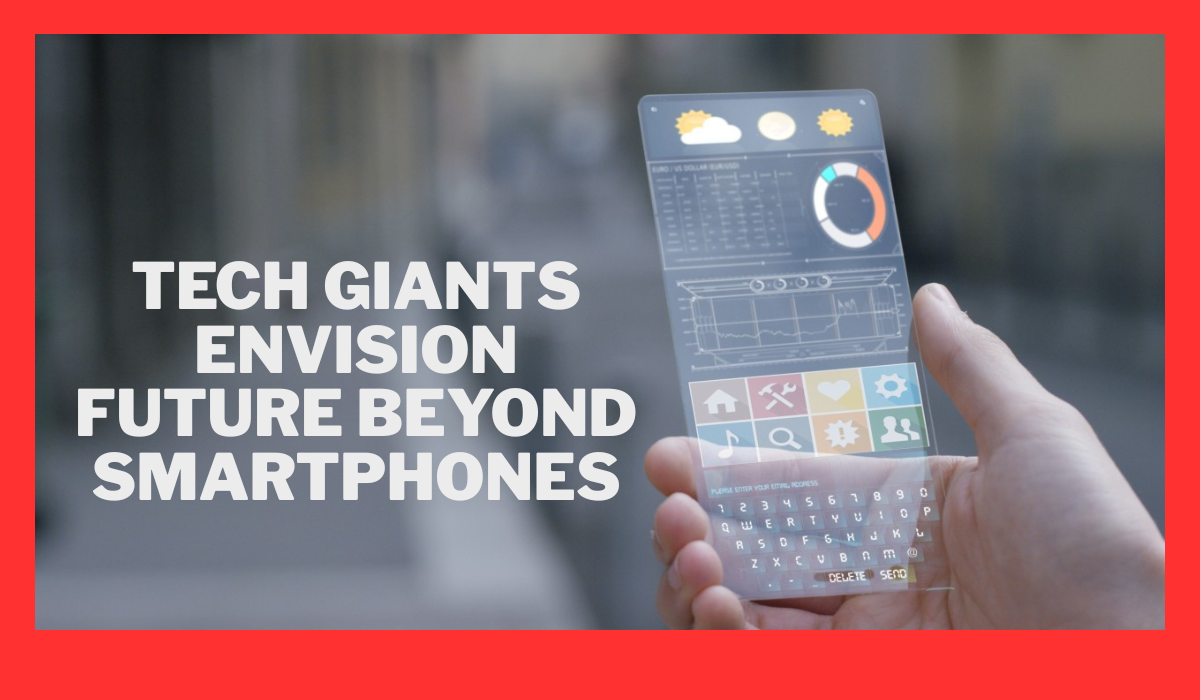Introduction to the Post-Smartphone Era
The digital landscape is shifting beneath our feet as we enter what many are calling the post-smartphone era. Gone are the days when smartphones held the crown as the ultimate personal device. Today, tech giants like Apple, Google, and Amazon are reimagining how we interact with technology. They’re exploring new frontiers that stretch far beyond a touchscreen in our pockets.
What does this mean for us? The answer lies in an exciting blend of innovation and imagination. As these companies redefine their roles, they set the stage for a future rich with possibilities—one where wearable technology, artificial intelligence, and immersive experiences take center stage. Join us on this journey as we explore how these tech titans envision a future beyond smartphones and what it means for society at large.
The Rise of Tech Giants and Their Influence
The tech giants are no longer just players in the game; they have become the architects of our digital landscape. Companies like Apple, Google, and Amazon wield immense power over technological innovation and consumer behavior.
Their influence extends beyond products to shaping cultural norms. Social media platforms dictate how we communicate while e-commerce giants redefine shopping experiences. This is a transformation that affects daily life on multiple levels.
As these companies push boundaries, they also set trends that other businesses follow. Their investments in research and development drive advancements in various sectors, from healthcare to entertainment.
Moreover, their reach goes global. With services available at the touch of a button, tech giants connect diverse populations across continents. This interconnectedness fosters collaboration but also raises questions about privacy and data security.
With every leap forward comes an increasing responsibility for these leaders—one that will shape not only technology but society as a whole.
The Impact of Smartphones on Society
Smartphones have transformed the way we communicate and interact. They connect us instantly, breaking geographical barriers. Social media platforms thrive on this connectivity, reshaping relationships.
However, reliance on smartphones has a darker side. Face-to-face interactions often suffer as people engage more with their screens than each other. The art of conversation is fading.
Moreover, access to information has become unparalleled. News updates are at our fingertips, but misinformation can spread just as quickly. This shift challenges critical thinking skills and demands digital literacy from users.
The impact extends into various sectors such as education and business. Learning resources are available through apps, making knowledge accessible to many. Businesses utilize smartphones for marketing and customer interaction like never before.
Yet mental health concerns arise too—anxiety linked to social media use or smartphone addiction is on the rise. Finding balance in this new landscape becomes essential for society’s well-being.
Shift towards Wearable Technology
Wearable technology is rapidly becoming the next frontier in our digital lives. Devices like smartwatches and fitness trackers are growing more sophisticated, seamlessly integrating into our daily routines.
These gadgets do more than just count steps; they monitor health metrics, track sleep patterns, and even connect with other smart devices. This shift allows users to access vital information without reaching for their smartphones.
Tech giants envision a future where wearables offer personalized insights into well-being. Imagine receiving real-time health alerts or tailored workout suggestions right from your wrist.
Moreover, the fashion industry has started collaborating with tech companies to create stylish wearable options that appeal to a broader audience. This fusion of style and function could pave the way for mass adoption.
As connectivity improves, we can anticipate an ecosystem where wearables communicate with home systems and vehicles—making life not just easier but also smarter.
Advancements in Artificial Intelligence and Virtual/Augmented Reality
Artificial intelligence is evolving rapidly, transforming the way we interact with digital environments. Machine learning algorithms now enhance our experiences in ways once thought impossible.
Virtual reality (VR) immerses users in entirely simulated worlds. This technology offers thrilling gaming and educational opportunities, allowing us to explore places without leaving home. Imagine attending a concert or visiting historical sites from your living room.
Augmented reality (AR) overlays digital information onto our physical surroundings. Apps like Pokémon GO have demonstrated AR’s potential for entertainment and engagement. But its applications extend beyond fun; industries are using AR for training and maintenance tasks.
Together, AI, VR, and AR create new avenues for creativity and productivity. They inspire innovation across various sectors—from healthcare to entertainment—promising a future where boundaries between the real and virtual blur significantly.
Ethical Concerns and Regulation
As tech giants envision the future beyond smartphones, ethical concerns are coming to the forefront. These companies hold immense power over personal data and privacy. With advancements in AI and wearable technology, the potential for misuse is significant.
Regulation becomes crucial in this landscape. Governments struggle to catch up with rapid innovation while ensuring that consumer rights are protected. There’s a delicate balance between fostering innovation and enforcing accountability.
Another pressing issue is algorithmic bias. When systems learn from flawed data, they can perpetuate existing inequalities or create new ones. Transparency in how these algorithms function must be prioritized.
Environmental impacts cannot be ignored either. As companies push for more devices and solutions, sustainability practices need to evolve accordingly. The responsibility falls on both creators and regulators to ensure technology serves humanity positively without compromising ethics or our planet’s health.
Predictions for the Future of Technology
The future of technology is unfolding like a captivating story, with tech giants leading the way. As they envision life beyond smartphones, we can expect to see smart environments that seamlessly interact with users.
Imagine homes and cities equipped with AI-driven systems that anticipate our needs. These innovations will transform daily tasks into effortless experiences.
Wearable devices will evolve from fitness trackers to advanced health monitors. They may even predict illnesses before symptoms arise, revolutionizing healthcare.
Virtual and augmented reality will redefine entertainment and education. Interactive learning experiences could replace traditional classrooms, making knowledge more accessible than ever.
The rise of autonomous vehicles promises safer roads and improved efficiency in transportation networks. This shift could reshape urban planning entirely.
With such rapid advancements on the horizon, one thing is certain: technology’s next chapter will be as thrilling as it is unpredictable.
Conclusion
The world is on the cusp of a new technological revolution, one that goes beyond the limitations of smartphones. As tech giants envision a future shaped by innovation, they are laying the groundwork for what’s next. The shift towards wearable technology and advancements in artificial intelligence show just how quickly we can adapt to new tools and experiences.
Wearables promise seamless integration with our daily lives, providing convenience without sacrificing functionality. Meanwhile, virtual and augmented reality open up uncharted territories for both work and leisure. These technologies are not merely enhancements; they reshape interactions entirely.
Yet as we embrace this evolution, ethical concerns loom large. Questions about data privacy, security, and regulation will require careful consideration as society navigates through these transformative changes.
Looking ahead, it’s clear that tech giants play an instrumental role in steering us toward this exciting frontier. Their vision extends far beyond smartphones—paving the way for innovations that could redefine human experience itself.
As we step into this post-smartphone era together, one thing remains certain: change is coming fast and furiously. Adaptability will be key as we explore what lies ahead in this brave new world of technology.





